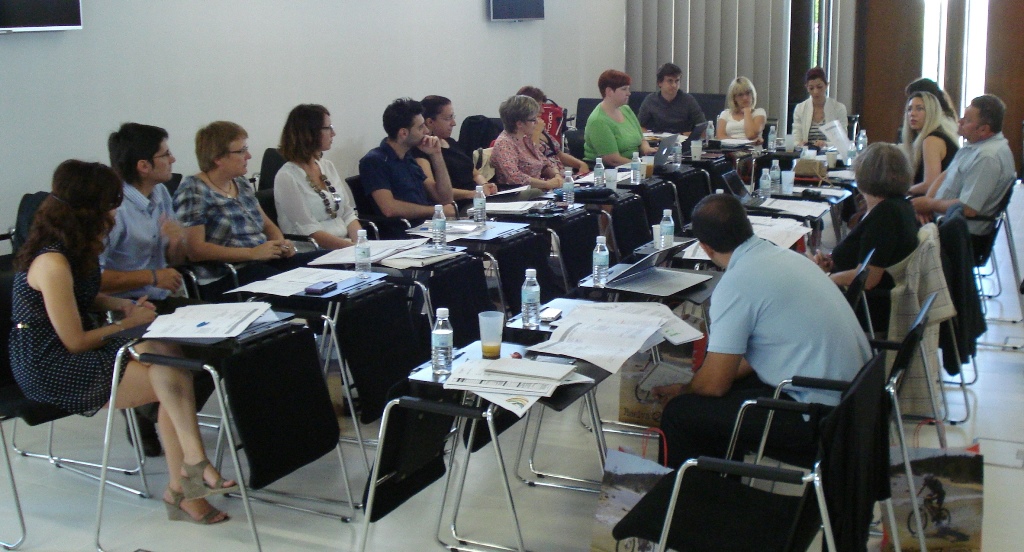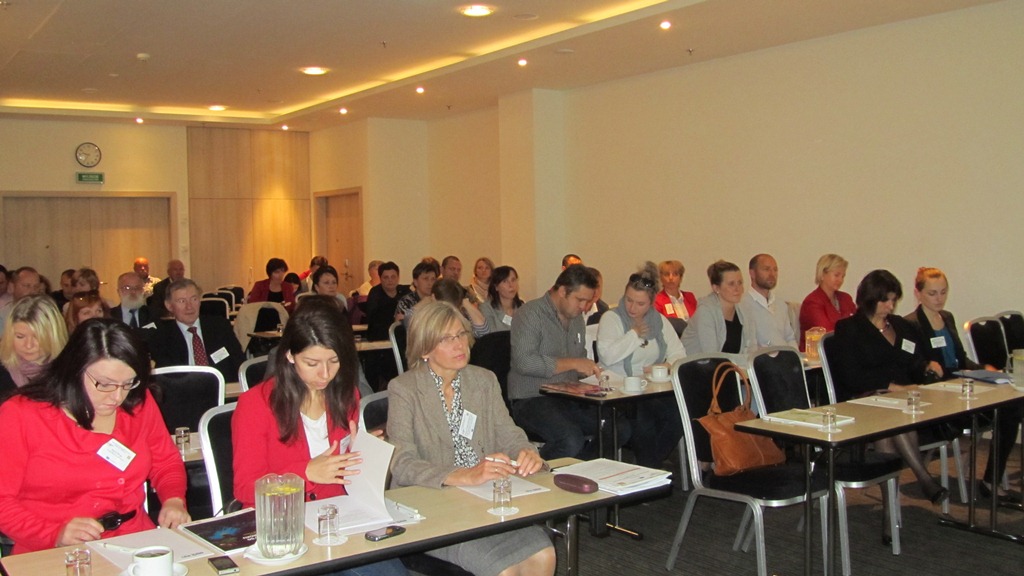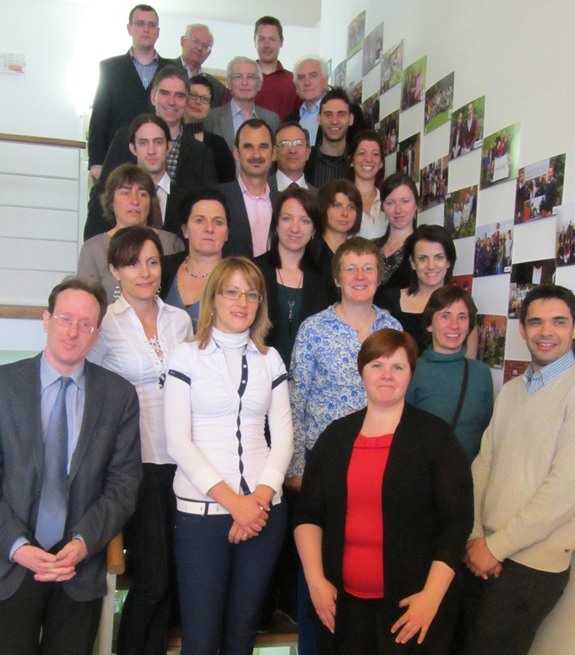Fourth project meeting
Location: Vaasa (Finland)
Date: 19-20 February 2015
The 4th project meeting has come to an end. For the two busy days the project partners discussed activities and achievements of schools and other public buildings implementing the 50/50 methodology, as well as debated on the barriers faced and possible ways of overcoming them. They also brainstormed together to disseminate the 50/50 concept among other countries, regions and municipalities, engaging new buildings in this common effort to save energy and join global fight against climate change. This time the meeting took place in Vaasa - a picturesque Finnish city!
2nd Polish workshop on the implementation of the 50/50 concept in schools
Location: Cracow (Poland)
Date: 7 October 2014
On the 7th of October 2014 PNEC – Polish partner of the EURONET 50/50 MAX project – orgnised in Cracow 2nd national workshop devoted to the practical aspects of energy saving and implementation of the 50/50 methodology in schools and non-school public buildings. The workshop was addressed to the representatives of Polish municipalities and schools (both teachers and caretakers) involved in the project, as well as other people interested in 50/50 concept. In total over 150 persons took part in the event.
The workshop was officially opened by Maria Stankiewicz, Advisor of the PNEC’s Director, who shortly introduced the Association and its activities. She also announced a contest for the most interesting educational games devoted to the issue of energy saving and climate protection. The contest is addressed to all energy teams created in schools participating in the 50/50 Network. Many attractive awards await for the winners. Details of the contest and its rules will be published soon on the Polish version of the project website: www.euronet50-50max.eu.
Third project meeting
 Location: Huelva (Spain)
Location: Huelva (Spain)
Date: 3-4 July 2014
Third project meeting of the EURONET 50/50 MAX partners on the 3rd and 4th of July 2014 was organized by Huelva Provincial Council and devoted mainly to the exchange of good practices and networking. During the meeting many crucial project steps were discussed and all the partners presented state of the art implementation of the project in 500 European schools and nearly 50 other public buildings in their countries. They also debated on how to encourage national, regional and local authorities to include this innovative and interesting methodology in their policies and strategies, as well as the ideas how to develop the catalogue of schools and non-school buildings. Finally the detailed instructions on the project website and savings calculation tool operation were given and it was agreed to use Facebook - however with some restrictions - as the networking platform.
On the first day of the meeting participants visited the Local Development Department of Huelva Provincial Council and University Campus where they had the opportunity to learn about the energy monitoring system.
Second project meeting
 Location: Vienna (Austria)
Location: Vienna (Austria)
Date: 7-8 November 2013
On the 7th and 8th of November 2013 the project partners of EURONET 50/50 MAX gathered in Vienna for the second time in order to discuss their up-to-date achievements and tasks for the nearest future. Major part of the meeting was devoted to the selection of schools and non-school buildings that will implement the 50/50 methodology within the project and join the 50/50 network gathering organisations which save energy by involving their members in the energy management. The partners also discussed the available methodological guidelines and educational material that may be used by schools and non-school buildings involved in 50/50 projects, as well as ways of the strategic roll-out of the 50/50 concept to encourage new public authorities and organisations to include it in their strategies and policies.
Inauguration of the EURONET 50/50 MAX in Poland

Date: 26-27 September 2013
Over 100 people took part in a conference and workshop which officially launched implementation of the EURONET 50/50 MAX project in Poland. Among the participants there were representatives of local authorities and schools involved in the project, as well as of other public institutions interested in saving energy and money at the same time.
Initial conference on the results of the first EURONET 50/50 project
Location: Brussels (Belgium)
Date: 14 May 2013
The first meeting of the EURONET 50/50 MAX project was accompanied by a conference entitled “Incentivising and empowering users to save energy in schools and public buildings”, which aimed at the dissemination of the results of the first EURONET 50/50. The event started with the presentations from the European Commission (representatives of the EACI running Intelligent Energy Europe Programme and from the DG Education and Culture) and the Covenant of Mayors Office who highlighted the contribution of the project to the achievement of European climate and energy goals. Afterwards, the participants had an opportunity to learn about 50/50 experiences that have been implemented successfully around Europe. The experience from Hamburg city was especially interesting, as it was the first city ever to apply the 50/50 concept. Other best practices presented, such as the one from Cornellà Council and the one from a finish school (Länsimetsän koulu), were also very motivating and inspiring!
First project meeting
 Location: Brussels (Belgium)
Location: Brussels (Belgium)
Date: 13-14 May 2013
On the 13th and 14th of May 2013 representatives of 16 organisations active in the fields of energy saving and energy education gathered in Brussels for a meeting inaugurating the EURONET 50/50 MAX project, co-funded by the Intelligent Energy Europe (IEE) Programme. The aim of the project is to mobilize energy savings in public buildings through the implementation of the 50/50 methodology in 500 schools and nearly 50 other public buildings from 13 EU countries. The 9-step methodology increases energy awareness of the building users and actively involves them in energy–saving actions. Achieved financial savings are equally shared between the building users and the local authority which covers the energy bills.
During the meeting, the project partners got to know each other and discussed their future tasks and expected results. Within the next three years they will engage schools and non-school buildings from 13 countries in the implementation of the 50/50 methodology and support them in their actions, i.e. by providing so called “e-packs” – sets of educational material and tools – and organizing dedicated trainings. They will also widely promote the 50/50 concept to encourage more public authorities and organisations to use it in their buildings.

















 The sole responsibility for the content of this website lies with the authors. It does not necessarily reflect the opinion of the European Union. Neither the EACI nor the European Commission are responsible for any use that may be made of the information contained therein.
The sole responsibility for the content of this website lies with the authors. It does not necessarily reflect the opinion of the European Union. Neither the EACI nor the European Commission are responsible for any use that may be made of the information contained therein.